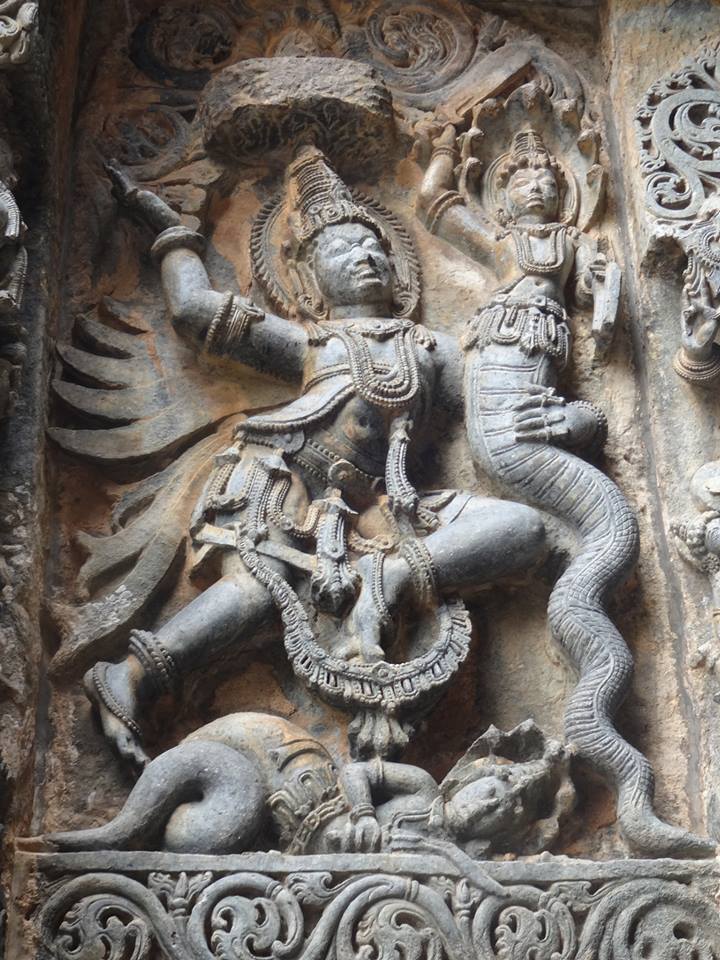Ancient Psychedelia: Alien Gods & Mushroom Goddesses
Online Book - Chapter 5, Page 78
Back to Online Book Mainpage / Next Page (Chapter 5, Page 79)
| Vāsuki is described as having a gem called Nagamani on his head. Manasa, another naga, is his sister. Vāsuki is Shiva's snake, usually coiled around Shiva’s neck. Vasuki is known in Chinese and Japanese mythology as being one of the “eight Great Dragon Kings.” Vāsuki took part in the incident of Samudra manthana (Ocean Churning) by allowing both the devas and the asuras to bind him to Mount Mandara, so that they could use him as their churning rope to extract the amṛta from the ocean of milk. In the Bhagavad Gita, Chapter 10, verse 28, Shree Krishna proclaims, “I am the Vajra (thunderbolt) amongst weapons and Kamadhenu amongst the cows. I am Kaamdev, the god of love, amongst all causes for procreation; amongst serpents I am Vasuki.” Takshaka (Takṣaka) last of the three Nagaraja mentioned in the Mahābhārata, is a Takshaka known in Chinese and Japanese as one of the “eight Great Dragon Kings,” they are the only snakes which can fly and also mentioned as the most venomous snakes. Takshaka lived in the Khandav forest (1,225). Nagas lived there with other tribes like the Pisacha, Rakshasas and Daityas and Danavas (clans of Asuras) (1,227). Garuda is an eagle in the Hindu religion. He is the son of Vinata and the brother of Arjuna and featured in the Mahābhārata as one of the bird deities, and stepbrothers to the Nagas, the serpent deities. Arjuna is the son of Indra and an excellent archer who accompanies Krishna in the battle. Krishna went first as an ambassador of peace to try to negotiate a treaty between both sides. Takshaka was king of the Nagas and friend to Lord Indra but joined sides with the Kauravas to take revenge on the Pandavas. This is very similar to the myth of Etana in Sumer as we will soon read about. Guradu is pictured with a mushroom above his head, fighting the nagas at the Hoysaleshvara Temple dated to 1100-1200 AD, with a mushroom atop his head (19g).  (19g) Garuda fighting the Nagas Hoysaleshvara Temple c. 1100-1200 AD |
It is understood that Krishna spent the early part of his life as a cowherd and became a lover of a particular milkmaid (gopi) named Radha. (59) The next several quotes are directly from Krishna cited in the Bhagavad-gita: Krishna: This spirit can never be destroyed in the mortal frame which it inhabiteth, hence it is unworthy for thee to be troubled for all these mortals. (60) Krishna: Those enlightened in the three Vedas, offering sacrifices to me and obtaining sanctification from drinking the soma juice, petition me for heaven; thus they attain the region of Indra, the prince of celestial beings, and there feast upon celestial food and are gratified with heavenly enjoyments. And they, having enjoyed that spacious heaven for a period in proportion to their merits, sink back into this mortal world where they are born again as soon as their stock of merit is exhausted. (61) Krishna: Neither the assemblage of the Gods nor the Adept Kings know my origin, because I am the origin of all the Gods and of the Adepts. Whosoever knoweth me to be the mighty Ruler of the universe and without birth or beginning, he among men, undeluded, shall be liberated from all his sins … believing me to be thus, the wise gifted with spiritual wisdom worship me; their very hearts and minds are in me; enlightening one another and constantly speaking of me, they are full of enjoyment and satisfaction. (62) Krishna: …. and among the wise of secret knowledge I am their silence. (63) Krishna: But those who seek this sacred ambrosia ― the religion of immortality ― even as I have explained it, full of faith, intent on me above all others, and united to devotion, are my most beloved. (64) (59) Cult of the Mother Goddess, p. 126 (60) A Book of Hindu Scriptures: The Bagavad Gita, The Upanishads, The Rig Veda, Theophania Publishing, p. 12; Chapter II Devotion Through Application to the Speculative Doctrines, the Bhagavad-gītā (61) ibid, 44; Chapter IX Devotion by Means of the Kingly Knowledge and the Kingly Mystery – the Bhagavad-gītā (62) ibid, 47; Chapter X Devotion by Means of the Universal Divine Perfections – the Bhagavad-gītā (63) ibid, 50; Chapter X Devotion by Means of the Universal Divine Perfections (64) ibid, 59; Chapter XII Devotion by Means of Faith |
Go Back to Page 77